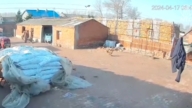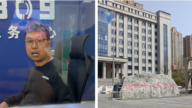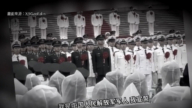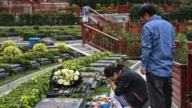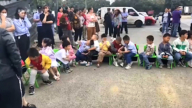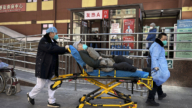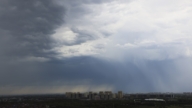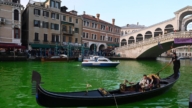【新唐人2014年02月03日訊】美國《紐約時報》駐北京記者王霜舟,日前因為簽證被拒,被迫離開中國,這是13個月來,第二名《紐約時報》記者因拿不到簽證,而被迫離開中國大陸。美國白宮發言人針對這起事件,罕見的發表聲明,譴責中共當局限制和阻礙外國記者工作,是在踐踏新聞自由。
據《美國之音》報導,美國白宮發言人卡尼在1月30號發表聲明說:中國拖延外國記者簽證,限制他們前往政府認為的「敏感地區」,在一些案例中,地方政府甚至採取暴力手段。這種做法違反了新聞自由,跟美國對待中國和其他外國記者的做法截然相反。
白宮罕見的聲明,引發了眾多駐華外國記者的共鳴。記者們指出,中共當局用各種手段刁難外國記者的現象並不是個例,而且非常普遍。
據了解,王霜舟是13個月來,第二名因拿不到簽證而被迫離開中國大陸的《紐約時報》記者。
「國際記者聯合會」香港和中國區代表胡麗云:「這一次是第二個美國記者拿不到簽證,其實還有記者也是美國的,去申請的時候也拿不到,或者就是一直在等。我們對於現在中央政府,對於外國記者在中國做工作或者採訪,好像對他們有怨言,我們不曉得它背後原因是甚麼。只不過我們看著就是一些甚至拿不到,甚至一直在等,或者就是甚至給拒絕,要求他離開。」
白宮的聲明還說:《紐約時報》記者王霜舟因為中國拖延頒發籤證而被迫離開中國,我們深感失望。我們繼續關注「王霜舟事件」,以及另外幾名美國記者等待幾個月,甚至幾年,都沒有得到記者證和簽證的問題。
另一名《紐約時報》駐北京記者黃安偉(Edward Wong),在王霜舟離開的當天發推文說,中國正徒勞的企圖通過封殺記者簽證和全球網站,來影響新聞報導。
胡麗云:「可能他們去做採訪報導的時候,就對中國政府做了一些批評,或者他們對於一些社會裏邊不公平的事情揭露出來,就出現他們去申請做簽證的時候就有困難。我們覺得中國中央政府,就按照記者他們去採訪報導的內容,來決定記者他們可以拿得到簽證還是拿不到。透過工作簽證作為門檻,去影響新聞自由是很明顯的一點。」
原《河北人民廣播電臺》編輯朱欣欣:「中共對境外媒體在中駐華記者格外警惕,唯恐給它們帶來所謂不利的影響和報導。但是它完全拒絕國外的也不可能,它只是想利用國外的媒體報,只是報導對他有利的內容,一旦國外的媒體,駐華記者總是挑一些報它認為不願意的看到的報導,就要打壓、封殺 、不給簽證。」
此外,外國駐華記者俱樂部、國際記者聯合會等組織,以及一些海內外記者、媒體人,都對中共當局的做法表示「 非常失望、憤怒和遺憾」。
朱欣欣:「這實際上不僅違背操守,違背新聞自由的世界共同認可的法制,它也是專制的文化在新聞方面的一個反映。」
「國際記者聯合會」香港和中國區代表胡麗雲指出,一份剛剛出來的關於中國和香港新聞自由狀況的調查顯示,在過去的一年中,中國新聞狀況越來越差。尤其是《央視》(CCTV)播放的有關「微博大V」薛蠻子、和《新快報》記者陳永洲認罪懺悔的鏡頭。胡麗雲表示,無論當事人是否自由,作為媒體,都不應該在法庭宣佈審判結果之前,播出相關認罪畫面,這一點,嚴重違反專業新聞的專業操守,和國際公約。
胡麗雲認為,《CCTV》徹底淪為了當局的宣傳工具,而不是一個新聞媒體。
胡麗雲還呼籲聯合國人權委員會,儘快調查中共對新聞自由打壓的真實情況,使外國記者能有一個正常的工作和採訪環境。
採訪/朱智善 編輯/張天宇 後製/蕭宇
White House Concerned As U.S. Journalist Forced Out of China
Beijing-based New York Times (NYT) reporter
Austin Ramzy, has been forced to leave China,
after his visa renewal request was denied.
Austin became the second NYT correspondent in 13 months
that has had to leave China, because of visa problems.
A White House spokesman later made
a rare announcement about the incident.
They criticized the Chinese Communist Party (CCP)
for “restricting the ability of journalists to do their work.”
This is clearly suppression of freedom of the press.
Voice of America (VOA) quoted Jay Carney, White House
press secretary, who made an announcement on January 30.
Mr. Carney said that the CCP impedes
foreign journalists from doing their job.
With “extended delays in processing journalist visas,
restrictions on travel to certain locations deemed
‘sensitive’ by Chinese authorities, and in some
cases, violence at the hands of local authorities”.
“These restrictions and treatment are not consistent with
freedom of the press—and stand in stark contrast with
U.S. treatment of Chinese and other foreign journalists.”
The White House statement was soon echoed
by many foreign journalists based in China.
They said the CCP commonly obstructs their work
by all possible means, not only in individual cases.
Austin Ramzy is known to be the second NYT reporter
obliged to leave China through denial of visa application.
Hu Liyun, International Federation of Journalists (IFJ)
representative, Hong Kong and China region: “This is the
second U.S. reporter whose visa application was denied.
In fact there are many other U.S. journalists who
failed to get, or are still waiting for, their China visa.
We feel that the CCP regime seems to have
complaints over foreign journalist activities in China.
However, we don’t know what the real reason is for that.
We can only see many visa applications
have been delayed or even denied.
This has forced correspondents to leave the country.”
The White House statement also said that:
“We are very disappointed that New York Times reporter
Austin Ramzy was forced to leave China today, because
of processing delays for his press credentials”.
“We remain concerned that Mr. Ramzy, and
several other U.S. journalists, have waited
months, and in some cases years, for a decision
on their press credentials and visa applications.”
Edward Wong, another NYT reporter in Beijing,
tweeted on the day Mr. Ramzy left China.
Wong said that the CCP authority was making
futile efforts to control media reports globally.
It was doing this by blocking journalists’
visas, as well as overseas websites.
Hu Liyun: “Possibly those journalists’ reports
had expressed some criticism against the party.
Or perhaps it revealed real injustice in Chinese society.
These activities then caused difficulties with their visa.
We believe that the CCP regime makes decisions
about whether to approve a visa for a journalist
according to what they have reported.
Obviously, they are using working visa
as a tool to restrict freedom of the press.”
Zhu Xinxin, former editor, Hebei Provincial Radio: “The party
is especially nervous with foreign journalists in China.
It fears for the so-called ‘negative’
social impact because of their reports.
On the other hand, it cannot block
all of them outside the state.
Indeed the party is only willing to see positive
reports from foreign media for its own benefits.
Once foreign media or journalists report something
against its favor, the CCP will suppress them by
blocking their reports or denying visa applications.”
In addition to foreign Correspondents’ Club of China
and IFJ, many other journalists and media workers
also expressed their “disappointment, anger and
regret” towards this latest decision by the CCP.
Zhu Xinxin: “This not only violates freedom of the press
and international rules protecting journalists’ rights.
It also reflects how autocracy affects media and their reports.”
Hu Liyun, IFJ representative, highlighted it’s latest
report on Press Freedom in China and Hong Kong.
It shows that the working environment for
journalists has worsened during the past year.
CCTV has broadcast footages of “confessions”
by Weibo “Big V” commentator Xue Manzi,
and New Express journalist Chen Yongzhou.
Hu said that any media should not broadcast the footages
of these “confessions” before a court verdict was made.
This is regardless of whether the
defendant was detained or not.
That was in serious violation of professional
ethics,as well as international treaties.
Hu Liyun says that instead of news media,
CCTV was only a propaganda tool for the party.
Hu further called on UN Commission on Human Rights
to investigate the CCP suppression of press freedom.
This is to protect the working environment
of foreign journalists working in China.
Interview/ZhuZhiShan Edit/ZhangTianYu Post-Production/XiaoYu


